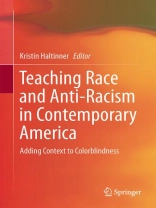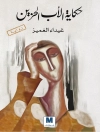This book presents thoughtful reflections and in-depth, critical analyses of the new challenges and opportunities instructors face in teaching race during what has been called the “post-racial era”. It examines the racial dimensions of the current political, economic, and cultural climate. The book features renowned scholars and experienced teachers from a range of disciplines and offers successful strategies for teaching important concepts through case studies and active learning exercises. It provides innovative strategies, novel lesson plans and classroom activities for college and university professors who seek effective methods and materials for teaching about race and racism to today’s students. A valuable handbook for educators, this book should be required reading for all graduate students and college instructors.
Tabella dei contenuti
Chapter 1. Introduction: Challenges and Opportunities in Teaching About Race and Racism in the 21st Century; Kristin Haltinner.- PART I: CULTIVATING IN THE SOCIOLOGICAL IMAGINATION.- Chapter 2. Challenging the Myth of ‘Post-Racial’ America: Revelations from Both Sides of the Desk; Joe Feagin and Jennifer Mueller.- Chapter 3. The Importance of a Race-Critical Perspective in the Classroom; Joyce M. Bell.- Chapter 4. Beyond the Trial: The Disproportionate Imprisonment of African Americans; Joshua Page and Sarah Whetstone.- Chapter 5. Confronting White Educationa; Privilege in the Classroom: Theoretical and Empirical Foundations and Models; Melissa F. Weiner.- Chapter 6. Teaching about Race and Racism: The Imperative of History; Tema Okun.- Chapter 7. Teaching About Organized Racism; Kathleen Blee and Kelsey Burke.- PART II. THE IMPORTANCE OF COMMUNICATION AND CLASS CLIMATE.- Chapter 8. Getting Students to Say What They Are Not Supposed to Say; Paul Croll.- Chapter 9. Dealing with Emotions in the Classroom; Carissa Froyum.- Chapter 10. Hózhó Nahasdlii – Finding Harmony in the Long Shadow of Colonialism: Two Perspectives on Teaching Anti-Racism at a Tribal College; Miranda Haskie and Bradley Steve.-Chapter 11. Teaching Millennials about Race and Ethnicity through First-Year Learning Communities; Carrie Cokely and Melissa Anyiwo.- PART III. CONNECTING WITH STUDENTS.- Chapter 12. After Colorblindness: Teaching Antiracism to White Progressives in the U.S.; Jonathan Warren.- Chapter 13. What Students Bring to the Classroom: Visions of a ”Post-Racial” America; Enid Logan.- Chapter 14. Bringing Students into the Matrix: A Framework and Tools for Teaching About Race and Overcoming Student Resistance; Abby Ferber.- PART IV. INNOVATIVE TECHNIQUES.- Chapter 15. Transformatory, Community Based Teaching about Race; Rose M. Brewer.- Chapter 16. Teaching About Race through Sports; John Bloom.- Chapter 17. Teaching About Affirmative Action; Jennifer Pierce.- Chapter 18. Unpacking the White Privilege Knapsack; Kristin Haltinner.- Chapter 19. Connections and Crossroads: Using Memoirs to Teach about Race and Ethnicity in the United States; Kristina B. Wolff.- Chapter 20. Lessons from ‘Cash’; Charlotte A. Kunkel.- Chapter 21. Experiencing Racialization: Digital Ethnography as Professional Development for Teachers; Nicholas P. Wysocki.- Chapter 22. ‘Veiled for Day’: Social Justice Experiments and Race Pedagogies; Jamil Khader.- PART V. ENGAGING WITH ACADEMIC INSTITUTIONS.- Chapter 23. How “Diversity” Trumped “Race” at One Elite Research University; Jorge Mariscal.- Chapter 24. Teaching about Systemic White Racism; Noel A. Cazenave.- Chapter 25. Teaching About Environmental Justice; David Pellow.- Chapter 26. Movement for Transformation: Motivating Students to Engage after the Class Ends; Walda Katz-Fischman, Jerome Scott and Ralph Gomes.- Chapter 27. Conclusion – Lessons Learned: Pedagogical and Theoretical Strategies for Teaching Race; Kristin Haltinner.
Circa l’autore
Kristin Haltinner is a graduate student and instructor at the University of Minnesota where she teaches courses on race, ethnicity, gender, sexuality and social justice. She also works as an adjunct instructor at Century College and St. Catherine University, teaching courses on contemporary social problems. Her work centers on social justice including the ways in which race, gender, sexuality and class inform and shape (or are shaped by) social movements. She has several projects under review at Sociological journals or in development including “Dissention on the Right: Gender in the Minuteman Civil Defence Corps” and “Rehab’s Dysfunctional Family: Challenges of Race in Drug Rehabilitation Centers” (with Dr. Teresa Gowan). Her dissertation is on the construction of race, gender, class and sexuality in right wing social movements and is expected to be completed by December 2012. She also has a published book chapter entitled Vigilante Groups in Battleground: Immigration. Edited by Judith Warner. (Greenwood Press. 2010). Kristin also is involved with various community groups including the Center for Holocaust and Genocide Studies, Solidarity in Health, and Scholars for Academic Justice.












